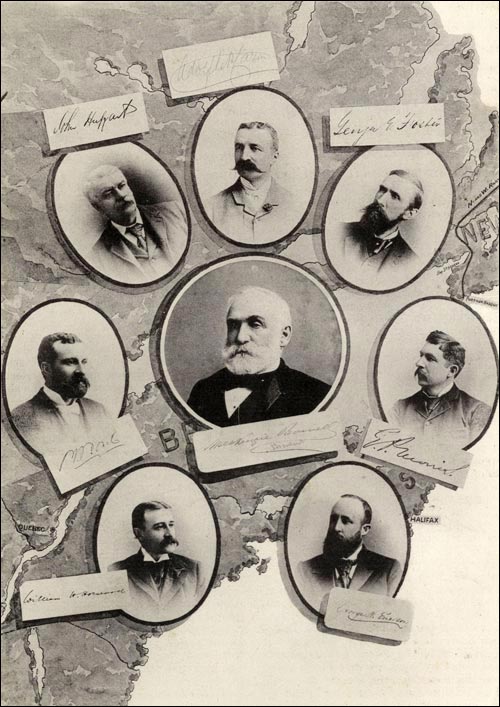The Confederation Negotiations of 1895
The collapse of Newfoundland's two private banks in December 1894 caused a serious financial crisis for the colonial government. In fact, the colony faced the real possibility of bankruptcy - an inability to pay the interest and other charges due on the public debt. There were three possible solutions. The government could ask the British government for help: This was refused. It could try and borrow money - but in the wake of the bank crash, it was very unlikely that there would be investors willing to lend. Or it could seek help from the Canadian government, which meant discussing confederation.
Choosing the last of these alternatives, on 20 February 1895 the government formally requested a conference on confederation. The talks began in Ottawa on 4 April. Neither side was very enthusiastic. The Newfoundland delegation, led by Robert Bond, was there because the colony had its back to the wall and could see no alternative. The Canadian government, led by of Sir Mackenzie Bowell, was politically weak and plagued by financial difficulties.

The Newfoundland delegation proposed:
- Canada would assume all Newfoundland's debts and liabilities, which a mounted to $15.9 million, or $76 per head of population.
- Railways built and planned should be counted as an asset worth $9.5 million.
- Canada would make annual payments of $819,273 to the new province.
- Canada would take over services costing $827,000 and make a variety of other grants.
The Canadian delegation baulked. It refused to accept the uncompleted railway as an asset, and offered:
- To assume debts and liabilities up to $10.4 million only, or $50 per head of population, leaving Newfoundland with a public debt of $5.5 million on which it would have to maintain payments.
- To make annual transfers of $465,000, a difference of $354,273 which the new province would be forced to find through local taxation.
The Newfoundlanders found these terms unacceptable. As a result, the British government was asked to provide the money to pay off the $5.5 million debt which the Canadians would not assume. The British thought that the Canadian government was driving an overly hard bargain, and refused.
The Canadians did offer to improve the annual transfer, but only by $35,000, and undertook to pay roughly 40 percent of the cost of completing the railway. But they would not take over the whole debt, mainly because of a fear that if Newfoundland was treated more generously in this respect than Prince Edward Island had been in 1874, all the provinces might begin to demand new financial terms.




